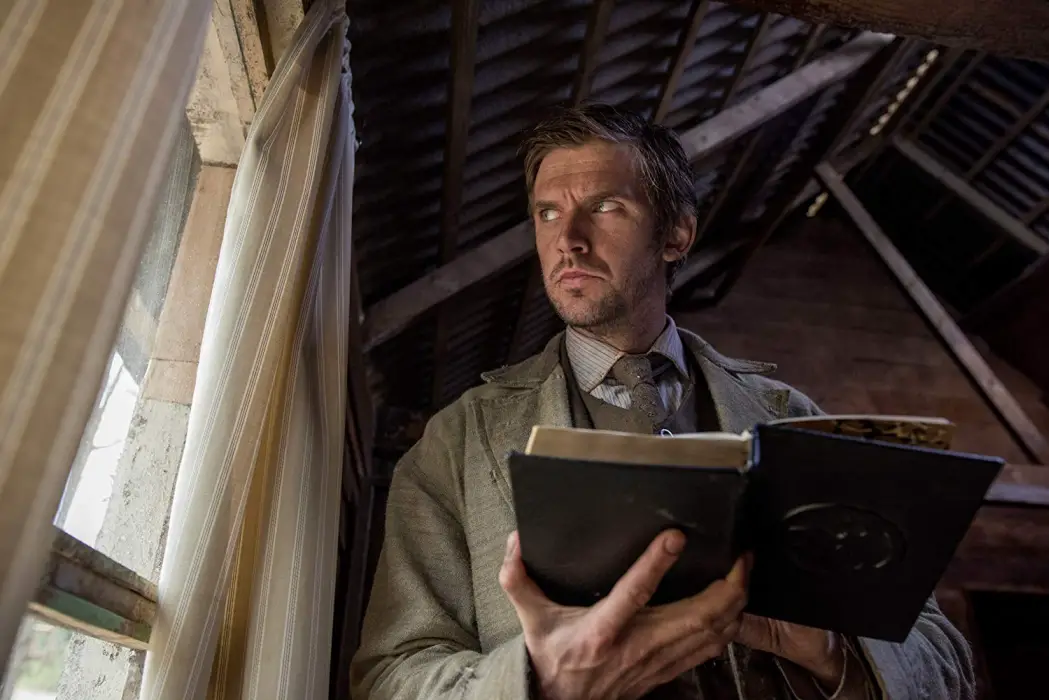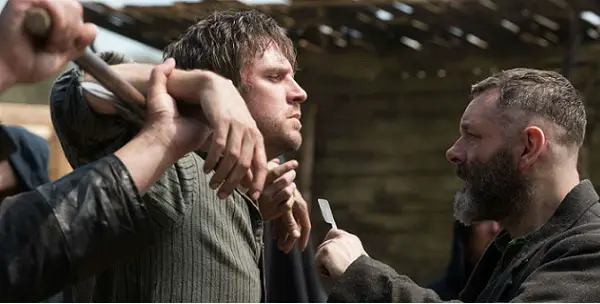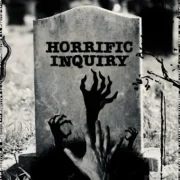Fantastic Fest Report 3: APOSTLE & CAM

Hazem Fahmy is a poet and critic from Cairo. He…
Apostle (Gareth Evans)

The The Raid films are easily two of the best action films of the 21st century, maybe even of film history. Welsh director Gareth Evans’s mastery of martial arts choreography and no nonsense storytelling earned him a hallowed place among action fans worldwide and dramatically upped the stakes for his first non-Indonesian feature, Apostle. I am beyond thrilled to report that Evans’s fourth feature is anything but a disappointment. In fact, it is a perfect example of how a fresh director can challenge his own brand while firmly keeping the standards that defined his first works.
Radically different in setting than Evans’s previous films, Apostle takes place on a remote island ruled by a mysterious cult in the early 20th century. Thomas (a brooding Dan Stevens) arrives to rescue his estranged sister, who has been kidnapped and held for ransom. Led by a charismatic prophet (Michael Sheen gloriously against type) the cult, as cults are wont to do, scrutinizes its members’ daily schedules, and constantly asks them to affirm and reaffirm their loyalty and faith, often through disturbing rituals. When they start to catch on that an intruder is in their midst, things go haywire very quickly, the sheer depth of the commune’s evil steadily begins to show itself.
Apostle speaks volumes to Evans’s talent as a genre filmmaker. Though the film leans far more towards a discernible horror aesthetic, it is clearly the work of a director whose sensibilities are rooted in adrenaline-soaked action. As such, the film seamlessly combines the morbid ambiance of horror, and especially religious horror, with the flow of a brawler film. The result is a fantastic blend held together by a masterful balance of tones and styles. A slow spine chilling sequence can be followed by a burst of Raid-style combat, and the audience need not bat an eye.
This is significant in thinking about Evans’s, hopefully very long, career. It is so easy and common for fresh directors who succeed with their earlier films to simply reduce their work to a formula and regurgitate ad infinitum. As often, they desperately try to break away from the genre and style they’d been associated with and end up losing what made their work special in the first place. But Evans challenges himself to explore new territory, in terms of both setting and genre, while coherently maintaining, and even further developing, his signature aesthetic. By the time the credits role, you understand how a horror British period piece fits in the same filmography as The Raid.
But this success would not have been possible without the pitch-perfect casting. Stevens excels as the troubled Thomas, an ex-preacher who has lost his faith, and trust, in religion. Unable to escape his haunting past, Thomas is motivated by nothing but his love for his sister. Though on paper Thomas might seem like the classic mysterious-guy-who-doesn’t-say-much trope, Stevens breathes life into the character’s every move and expression, embedding him a visceral sense of personal history. Sheen is absolutely on his best here as the apocalyptic prophet Malcolm. It’s a powerhouse delivery that maintains the character’s performativity without ever being overtly unhinged.
The religious themes of the film, though occasionally a bit on the nose, fit firmly with the unsettling ambiance and the constant sense of dread. Apostle isn’t interested in grand or definitive statements so much as it is in cleverly exploring the ways faith can be abused to manipulate and coerce others. Evans pays particular attention to the inherent gendering of such abuse, and is not subtle in his indictment of masculinity’s role in cultic organizations. This is especially pronounced in Ffion and Andrea’s arcs, Kristine Froseth and Lucy Boynton respectively, who are both stellar. Their faith in their community and its beliefs is inextricable from their faith in their fathers, a relationship that leads to tragic and nuanced revelations.
Gender is also explored in the cult’s relationship with the island on which they’ve settled and built their community. Critiques of human’s relationship with the environment along gender lines are nothing new, but Evans breaks new ground in his acute integration of these observations within the confines of a fine-tuned horror narrative, and he far surpasses other recent films that have attempted this, such as last year’s messy Mother!. I won’t say any more so as not to give away the good stuff.
Though I continue to bite my nails waiting for a Raid sequel, or at least a spiritual successor, I’m completely giddy just thinking about where Evans will go from here. If his earlier work proved his mastery of action filmmaking, Apostle proves he might have the chops to tackle any genre he pleases. Such iron commitment to form and craft never ceases to be refreshing, but it’s especially delightful in a blockbuster environment that often reduces genre to condescending formulas. I only hope the big leagues will learn a thing or two from his already incredible filmography.
Cam (Daniel Goldhaber)

As Hollywood studios struggle to find their footing in this tumultuous age of franchise fatigue and mediocre “original” products, Blumhouse, though not exactly innocent of these woes, continues to stand out in its willingness to invest in risk-taking, innovative projects. Many still primarily think of the small studio as a horror house, but it’s easy to forget that they’ve been responsible for gems as diverse as Whiplash, Get Out, and even BlacKkKlansman. The release of Daniel Goldhaber’s debut feature, Cam, only hammers in that Blumhouse’s commitment to compelling and unorthodox projects, especially by newcomers, is anything but a fluke.
As gorgeous as it is chilling, Cam’s genre-bending tale is a breath of fresh air in an American horror scene obsessed with jump scares and lackluster CGI. Though exquisitely crafted, the film does the heavy horror lifting in Isa Mazzei’s tight script. The concept alone makes me terribly anxious. Cam follows Alice (Madeline Brewer), a professional “cam girl” who prides herself on her standards, integrity, and ambition. She’s built a dedicated fan base by the time the film has opened, and is striving to leave her mark on the popular freegirls.com by breaking into the top fifty of the site’s ranking. Everything seems to be going smoothly until one night, she suddenly finds herself unable to log into her account, before staring in shock at her screen as a doppelganger of hers hijacks her identity, fans, and money.
Tech-based horror and thriller films tend to be a hit or miss, but the steady increase in their frequency (take this year’s second Unfriended film and the recently released Searching) bodes well for their future, and Cam is a triumph of this burgeoning subgenre, both aesthetically and thematically. Goldhaber makes exceptional use of screen footage and audio, turning Alice’s cyberspace into a pulsating, cinematic arena that’s as alive as her physical space. The rhythmic editing strikes a sweet balance that never allows the use of screen footage to become a mere gimmick or crutch. This is complemented by a stellar soundscape that makes perfect use of phone and computer alerts as audio motifs, becoming an integral part of the suspense and horror.
But all this wouldn’t work half as well if it weren’t for Brewer’s performance. Embodying a character with such a sharp distinction between her personal and professional life is no cakewalk, but Brewer makes it seem absolutely seamless. She’s able to firmly distinguish between the Alice who hangs out with her family, the Alice who hangs out with other cam girls, and Lola, her pseudonym for her cam work. And yet, these different versions always feel cohesive with one another, presenting us with a rich and deeply believable character.
The script’s nuanced approach to sex work is integral to this believability. Mazzei and Goldhaber steer clear of the plethora of tropes and inaccuracies that often characterize portrayals of women involved in any kind of sex work in mainstream media. They never patronize Alice, nor do they ever try to make her out to be “damaged” or desperate in any kind of way. She is simply doing a job that she enjoys and gets good money out of.
Even when the horror elements kick in, the film makes sure to never make cam work itself the subject of moral condemnation, and the hell Alice goes through is never positioned as some kind of inevitable result of her own actions. Rather, the horror is grounded in our fear of the internet as an infinitely open space with the capacity to force creeps, in Alice’s case both real and supernatural ones, into our orbit, despite our best precautions. As more of our lives shift to the internet, cyber identity theft becomes more and more destructive. In Alice’s case, witnessing this mysterious lookalike take over her account makes her feel utterly violated, not just because she’s losing money and popularity, but rather because she’s losing control of her personhood.
All that said, the film’s last stretch suffers a from a weak payoff to the film’s supernatural elements. The sheer suspense and discomfort of watching Alice’s identity stolen before her eyes gives a foreboding sense of buildup that ultimately feels anticlimactic. Moreover, there’s a shift around the third act that pushes the film towards interpersonal drama, leading to scenes with Alice’s family that work well on their own, but feel somewhat disjointed from the rest of the narrative.
Then again, it’s hard to get too hung up on them given the compassionate way through which they address incredibly urgent matters such as harassment (both online and in real life) as well as societal hypocrisies around sex and sexuality. We need more stories that shed honest light on sex work while humanizing the people who do it and, on that end, Cam gets the job done.
Does content like this matter to you?
Become a Member and support film journalism. Unlock access to all of Film Inquiry`s great articles. Join a community of like-minded readers who are passionate about cinema - get access to our private members Network, give back to independent filmmakers, and more.
Hazem Fahmy is a poet and critic from Cairo. He is an Honors graduate of Wesleyan University’s College of Letters where he studied literature, philosophy, history and film. His work has appeared, or is forthcoming in Apogee, HEArt, Mizna, and The Offing. In his spare time, Hazem writes about the Middle East and tries to come up with creative ways to mock Classicism. He makes videos occasionally.













